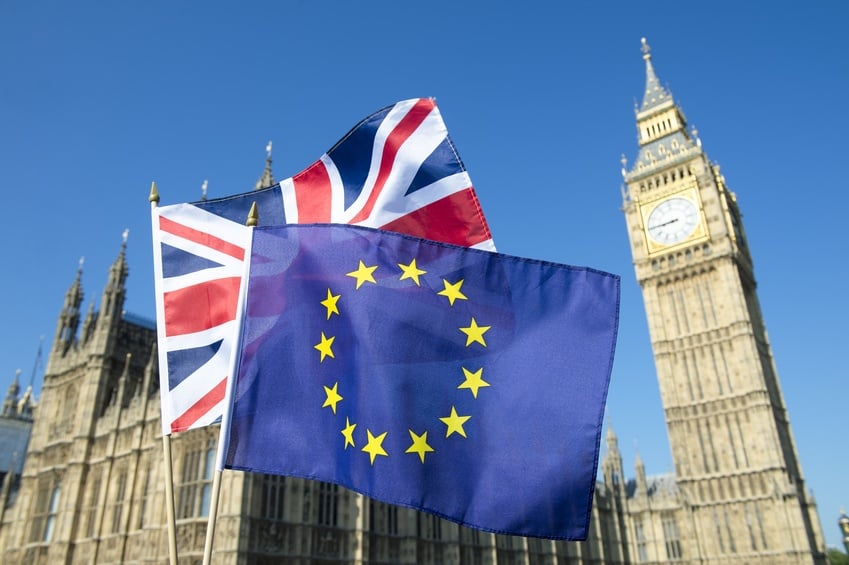 In the wake of the United Kingdom’s surprising vote to leave the European Union, markets worldwide reacted with predictable turmoil.
In the wake of the United Kingdom’s surprising vote to leave the European Union, markets worldwide reacted with predictable turmoil.
China’s central bank devalued the yuan, signaling its fears that the Brexit may further slow China’s already-shrinking GDP over the next year.
Britain’s pound sank to a 31-year low against the U.S. dollar — although this would inevitably help Britain North Sea petroleum exports, it doesn’t bode well for British retailers and other net importers. As a result, Standard & Poor’s downgraded the United Kingdom’s credit rating.And on Wall Street, the Dow lost almost 900 points in the 2 days immediately following Britons’ vote — the worst 2-day slide in almost a year.
Temporary shocks
But, as usually happens, the markets’ volatility began to ease quickly thereafter. Once more panicky investors were again on the sidelines, the Dow rebounded nearly 1,000 points by the end of last week, the S&P 500 index rose 1.7 percent and the NASDAQ rose nearly 2 percent.
So what does the Brexit vote mean for a senior living in Cincinnati? For now, remarkably little. There’s no reason to overhaul your retirement plan quite yet.
In a Wall Street Journal op-ed published several days after the vote had taken place, NASDAQ CEO Robert Greifeld noted that Brexit could, counterintuitively, end up being a net boon for global trade.
“An exit vote could open doors to new trade with an independent Britain,” he wrote. “An independent UK will be free of the fiscal and regulatory costs of the EU and could cut or even eliminate tariffs while developing a new, vastly simplified regulatory approach.”
Investors will recall that even as a full member of the Union, Britain never adopted the euro. The pound sterling is still a desired reserve currency.
As Greifeld is correct to point out — Britain, as a (relatively) financially stable, politically stable nation in an increasingly unstable world — has an opportunity to once again assume the mantle of a central hub of world trade. And, the competition it could in the long run give to the European Union could force the bloc to become less economically rigid.
“The promise of the European Union was in part increased trading among members of the bloc.
However, British dependence on trade with the EU is at a record low and falling,” Greifeld pointed out. “Exports of goods and services to countries outside of Europe have risen steadily.”
“After Brexit there is good reason to believe that the U.K. will have the leverage to expand on this trend. Over the next two years, the timeline for EU withdrawal, Britain has an opportunity to become a trading magnet for countries in the EU and beyond,” he argued. “Success could embolden the EU to take a similar tack to ensure that it remains competitive and maximizes trading opportunities for its members.”
Why increased competition from an independent Britain could help seniors’ retirement budgets
An increase in global competition for trade should tend to drive down prices worldwide. British exporters will now be able to pressure EU exporters on price fronts.
That could be excellent news for the United States. The European Union is our largest trading partner, and one with which we run a significant trade deficit (we import far more from the EU than the EU imports from us).
If the dollar continued to rise against both the euro and the pound, while resurgent British price competition simultaneously forces EU exporters to lower prices and the EU Parliament to eliminate quotas and tariffs, US importers would benefit. And, hypothetically, they would pass on the savings to American consumers.
At the same time, a stronger dollar benefits retirees who travel. If you’ve been planning a visit to the United Kingdom or to Europe, it may be a great time to go now, while the exchange rate is favorable, and stretch those dollars.
If you’re a senior living in Cincinnati, the Brexit vote doesn’t necessarily mean it’s time to overhaul your retirement plan.
But it does mean that there’s a bit more potential volatility in the market in the near term. You should talk with your trusted financial advisor to determine how your portfolio and your retirement budget may be affected.












